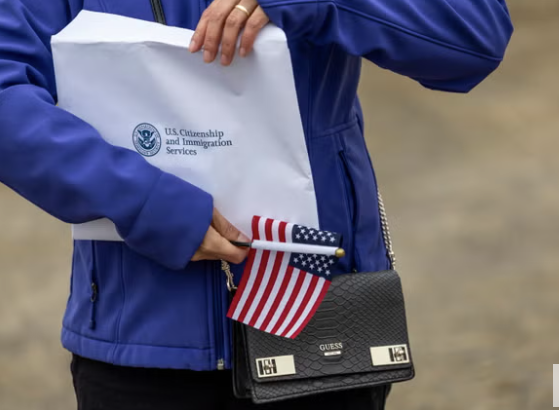Immigrants married to U.S. citizens have long believed they would be safe from deportation while applying for a green card. But a new directive from Donald Trump’s administration makes it clear: they can still be removed from the country — even if their applications are pending.
Deportation Risk for Green Card Applicants
The U.S. Citizenship and Immigration Services (USCIS) issued updated guidance this month allowing immigration authorities to start removal proceedings for immigrants without legal status who are applying for permanent residency through a citizen spouse or family member.
The policy covers a wide range of applicants, including:
-
People who overstayed their visas.
-
Immigrants who lost Temporary Protected Status (TPS) — roughly 1 million people under the Trump administration’s cuts.
-
Applicants with pending green card requests through other citizen relatives.
“A family-based petition accords no immigration status nor does it bar removal,” the new USCIS policy states.
Officials say the rule aims to “enhance benefit integrity” and detect fraudulent or frivolous applications. The agency claims the change will improve its ability to verify genuine marriages and family ties.
The rule, filed on August 1, takes effect immediately.
Scale of the Impact
In the first half of 2025 alone, immigrants and their families filed over 500,000 I-130 petitions — the initial step toward getting a green card through a relative. There are currently 2.4 million pending petitions, nearly 2 million of which have been waiting for over six months.
Previously, USCIS would issue warnings about missing documents or potential denial, giving applicants time to respond. Now, they can face immediate denial and be sent to immigration court.
Family-based immigration remains the largest pathway to permanent residency, accounting for nearly half of all new green card holders each year.
Advocates Sound the Alarm
“This is one of the most important avenues for people to adjust to lawful permanent status in the United States,” said Elora Mukherjee, director of the Immigrants’ Rights Clinic at Columbia Law School. She noted that under long-standing policies, no one expected deportation during the marriage-based application process. Now, proceedings can start “at any point,” which could create fear among immigrant families — even those following every rule.
A green card alone does not guarantee protection from removal.
The recent arrest of Columbia University student Mahmoud Khalil sparked outrage after the administration appeared to target him for his constitutionally protected speech, despite his lawful permanent resident status.
Last month, Customs and Border Protection warned green card holders that the government can revoke their status if they violate U.S. laws. The agency also cautioned that those with prior criminal convictions could face mandatory detention at ports of entry.
Citizenship Revocations for Children
In a separate move, a recent USCIS memo revealed plans to revoke citizenship from children whose parents lack permanent lawful status — even if the parents are legally in the U.S. on visas, protected under DACA, or seeking asylum.
This policy aligns with Trump’s executive order narrowing birthright citizenship, a right guaranteed by the 14th Amendment and upheld by the Supreme Court for over a century. The memo suggests the agency is ready to implement the change if courts allow it.
Trump’s order goes further than previous interpretations, denying citizenship to children born in the U.S. if:
-
The mother is undocumented or only temporarily in the country on a visa.
-
The father is not a U.S. citizen or lawful permanent resident.
USCIS also lists more than a dozen categories of immigrants whose U.S.-born children could be affected, including those from countries with Temporary Protected Status.
If implemented, the policy could deny citizenship to over 150,000 newborns each year. The Supreme Court is expected to hear arguments on the order’s legality later this year.















Leave a Reply